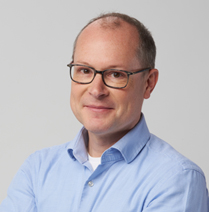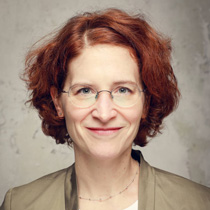
Dr. Markus Urban
Markus Urban was born in 1976 in Würzburg, directly on the Main River. He became a Nuremberger at the age of five, and his interest in history awoke during his final years at school. During his studies at the University of Erlangen (Germany) and Kalamazoo College (Michigan, USA) he often guided visitors over the former Nazi Party Rally Grounds and through the Palace of Justice in Nuremberg. In 2006, Markus obtained his doctorate with a thesis on the Function and Perception of the Nazi Party Rallies.
At the same time he developed his first series of onboard talks for river cruises and signed up as a tour leader between Amsterdam, Budapest and the Black Sea. As well as Markus’s continued work on academic historical projects, he is also a certified and practicing “Beersommelier”, having studied at the Doemens Akademie near Munich. Markus‘s main passion is to travel around the world. Last summer, he rented a small boat together with his family and friends to explore the rivers, canals and locks of Burgundy, France.
Nürnberg 1968. Die SPD und der Protest der APO. Ausstellungskonzept und -realisierung im Auftrag von „Geschichte für Alle e.V. – Institut für Regionalgeschichte“ für die SPD Nürnberg und das Museum Industriekultur, 2018.
Das Hufeland-Haus. 50 Jahre Diakonisches Netzwerk sozialer Dienste in Frankfurt-Seckbach, Frankfurt am Main 2014.
The Main-Danube Canal. Idea – History – Technology (with Daniel Gürtler), Nürnberg 2013.
Kollektivschuld durch die Hintertür? Die Wahrnehmung der NMT in der westdeutschen Öffentlichkeit, 1946–1949, in: Priemel, Kim / Stiller, Alexa (eds.): NMT. Die Nürnberger Militärtribunale zwischen Geschichte, Gerechtigkeit und Rechtschöpfung, Hamburg 2013, 684–718.
Die inszenierte Utopie. Zur Konstruktion von Gemeinschaft auf den Reichsparteitagen der NSDAP, in: Schmiechen-Ackermann, Detlef (eds.): ‘Volksgemeinschaft’: Mythos, wirkungsmächtige soziale Verheißung oder soziale Realität im ‘Dritten Reich’?, Paderborn 2012, 135–158.
The Self-Staging of a Plebiscitary Dictatorship: The NS-Regime Between ‘Uniformed Reichstag’, Referendum and Reichsparteitag, in: Jessen / Richter (eds.): Voting for Hitler and Stalin. Elections Under 20th Century Dictatorships, Frankfurt 2011, 39–58.
Neumarkt in der Oberpfalz im Nationalsozialismus, Nürnberg 2010.
Memorialization of Perpetrator Sites in Bavaria, in: Niven, Bill / Paver, Chloe: Memorialization in Germany since 1945, Houndsmills/NewYork 2009, 103–113.
The Nuremberg Trials. A Short Guide (= Historische Stadtspaziergänge 5), Nürnberg 2008.
Die Konsensfabrik. Funktion und Wahrnehmung der NS-Reichsparteitage, 1933–1941, Göttingen 2007.
The Nazi Party Rally Grounds in Nuremberg (with Alexander Schmidt). A Short Guide (= Historische Stadtspaziergänge 4), Nürnberg 2006.
Der Nahverkehr im Dritten Reich, in: Verkehrsaktiengesellschaft Nürnberg (eds.): 125 Jahre Nahverkehr in Nürnberg, Nürnberg 2006, 47–64.
Weltgeschichte im Schwurgerichtssaal. Die Nürnberger Kriegsverbrecherprozesse, in: Geschichte für Alle e.V. (eds.): Spaziergänge in die Vergangenheit Nürnbergs, Cadolzburg 2005, 69–76.
Offizielle und halboffizielle Amerikabilder im Dritten Reich. Deutsche Amerikaliteratur als Spiegel der politischen Entwicklung?, in: Behrends, Jan / von Klimó, Árpád / Poutrus, Patrice (Hrsg.): Antiamerikanismus im 20. Jahrhundert. Studien zu Ost- und Westeuropa, Bonn 2005, 52–71.
Reichsparteitag, Luftangriff und Wiederaufbau. Sonderbeilage “60 Jahre seit Kriegsende“ zur Kundenzeitschrift VAGmobil 2/2005 der Verkehrs-Aktiengesellschaft Nürnberg.

Daniel Gürtler
Born and raised in Nuremberg, Daniel Gürtler already at a young age became a history buff, with a special interest in the rich past of his hometown. Thus, it was only logical that during his last years of high school he began working as a local guide in Nuremberg’s old town as well as on the former Nazi Party Rally Grounds. It was around this time that he established his first contacts with river cruise providers, giving lectures and doing city tours.
During his studies of history at the University of Erlangen and at the Université de Savoie in Chambéry, France, Daniel began working with Markus Urban, jointly taking on numerous lectures and programs in the following years. In addition to his work as a public speaker and local guide, Daniel remains active in the area of academic historical research. His main fields of interest lie in social and engineering history with a special focus on the 19th and the 20th century.
70 Jahre Plärrerhochaus, in: Stadtarchiv Nürnberg, Norica 19, Nürnberg 2023, S. 85-93.
Die Marienvorstadt – Nürnbergs erste Stadterweiterung, Nürnberg 2022.
Der Nürnberger Westen (with Martin Schieber and Reiner Eismann), Nürnberg 2021.
100 Jahre Gesundheitsamt Nürnberg (with Pascal Metzger), Nürnberg 2020.
Das Nürnberger Volksbad (with Bernd Windsheimer), Nürnberg 2019.
Fürther Straße – Aufbruch und Wandel (with Reiner Eismann). A Short Guide (= Historische Spaziergänge 14), Nürnberg 2017.
Wöhrd – Die untergegangene Vorstadt. A Short Guide (= Historische Spaziergänge 12), Nürnberg 2015.
The Main-Danube Canal. Idea – History – Technology (with Markus Urban), Nürnberg 2013.
Schwabach – Die Goldschlägerstadt (with Martin Schieber). A Short Guide (= Historische Spaziergänge 10), Nürnberg 2012.
Mauern, Türme und Bastionen. Die Nürnberger Stadtmauer. A Short Guide (= Historische Spaziergänge 9), Nürnberg 2012.
Die Geschichte der Berufsschule II in Nürnberg, Nürnberg 2010.
Kliniken Dr. Erler. Geschichte und Gegenwart (with Bernd Windsheimer),Nürnberg 2009.
Hochwasser in Nürnbergs Geschichte, in: Stadt Nürnberg (Hrsg.): Die Pegnitz flutet Nürnberg. Zum 100.ten Jahrestag der großen Hochwasserkatastrophe, Nürnberg 2009, 6–12.
50 Jahre Städtische Werke Nürnberg (with Bernd Windsheimer), Nürnberg 2009.
225 Jahre Staedtler & Uhl – Ein Spiegelbild Schwabacher Nadelproduktion, Nürnberg 2008.

Anne Urban
Anne Urban (née König) was born and raised in Augsburg, a small Roman-founded town in the South of Germany, in a household full of books. Consequently, she very soon developed a strong interest in everything connected to language and books, be it their history or the history of reading and writing, typography or the book trade. It was therefore only natural for her to move to Erlangen (Germany) for her studies of Buchwissenschaft (book studies). Here she completed her M.A. with a thesis on legibility.
During this time she also did her M.Ed. at Pennsylvania State University (U.S.) and taught German to college students. After university Anne started to work in different leading positions in Germany’s largest bookstores in various cities – to ultimately return to Nuremberg and her husband Markus Urban. Soon after their daughter was born she started working for urban history, giving onboard talks and managing the myriad administrative tasks that go with it. She enjoys traveling with her family and loves reading in and about books – on the rare occasions time allows.
Lesbarkeit als Leitprinzip der Buchtypographie (= Alles Buch No. VII). Ed. by Ursula Rautenberg und Volker Titel. Institut für Buchwissenschaft, Universität Erlangen-Nürnberg. Erlangen, 2004.